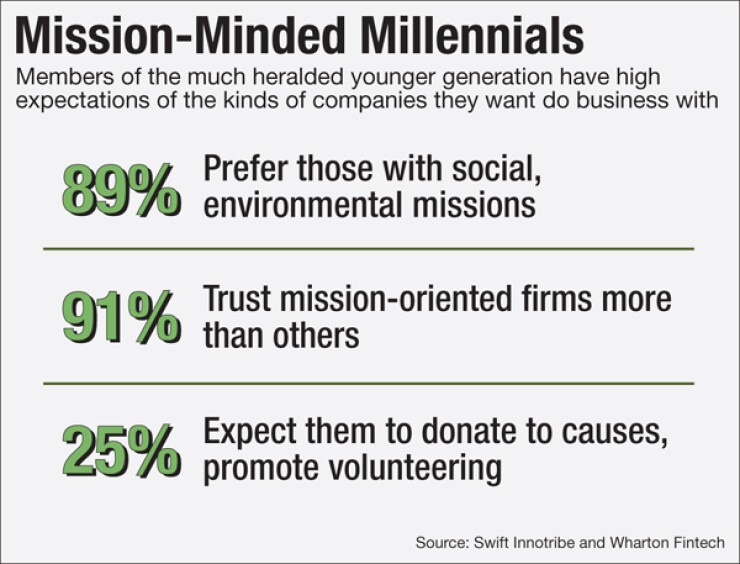-
The Minneapolis bank has found a novel way to persuade depositors to try online bill pay -- a service known to discourage customers from moving accounts but that banks nationwide are struggling to get more accountholders to use.
January 28 -
Startup CommonBond crowdsources funds from alumni members and interested investors to establish a loan pool for student lending.
March 25 -
Transaction data tied to rewards comes with a twist: donating cash back to charity. The California startup called Mogl seeks credit union partners.
January 13 -
Radius Bank's partnership with online investment firm Aspiration highlights a nascent trend among small banks in the race to win millennial customers: partnering with fintech firms rather than opening branches.
July 20

When
So the startup put a plan in place that began with its pilot launch in November 2012: For every loan it fully funded on its platform, CommonBond funds the education of a needy student in a foreign country for a year.
"We wanted to make sure that the better we did at the company, the more social good we are able to drive," said David Klein, chief executive and co-founder at CommonBond. "Businesses could and should be a force for positive social change."
By yearend, CommonBond will have donated over $200,000 through its current partnership with nonprofit Pencils for Promise.
The one-to-one model, as it is called, is more typical in other industries – with consumer goods companies Toms Shoes and Warby Parker having led the charge in the U.S. But it's a rare model for an industry selling intangible goods.
Banks have long made contributions to nonprofits. But the newer twist on giving ties closely to brand values and a desire to resonate with young consumers searching for products, services and jobs. Some, such as CommonBond and
Their stated ethos underscores the need for businesses to do more than just sell good products. According to a
And disruptors with social missions baked into their DNAs have in their sights the segment all brands are after: millennials.
Daniel McAuley, an author of a recent
An institution making a large, one-time contribution to a charity is less top of mind for consumers than a company that correlates buying a product with a donation.
"It's not a vague fuzzy link," McAuley said. "It's a lot more concrete."
And it could align with what young adults already believe in.
Klein says millennials – CommonBond's target customer segment – want to do business with companies whose values they share. So not only does he see a strong social mission as the right thing to do but also as a way to stand out in the crowd – including attracting customers and talent to the brand.
"Financial interest and social impact are not mutually exclusive but in fact are mutually reinforcing," he said.
Socially Conscious Banking
Startups, which don't have long-standing brands that consumers already trust, can and do make social missions part of their raison d'etre in addition to their digital goals to
Some of these upstarts' battle cries are aimed at democratizing financial services at a time when banks are taking heat for charging their biggest fees to consumers who are living paycheck to paycheck. So lower pricing structures and easier-to-understand language are among the strategies in a growing fleet of fintech startups – all of which McAuley believes could provide "tremendous social good."
Aspiration, which most recently launched a name-your-price checking account, formed its company with the heart of the brand working to help the middle class build wealth with a charity twist: Aspiration donates one dime for every dollar the startup makes to charities.
It's too soon to share results on what customers are paying for its latest checking account product. But Andrei Cherny, a co-founder and chief executive of Aspiration, says its initial account is getting what the startup believes is fair: well under 10% pay zero.
Without drawing a direct line, Cherny says he does see "customers on a daily basis coming to us because they are excited about the 'giving' part of our mission and want to be associated with a financial services company that shares their values."
The California startup, which aims to create a digital global tech brand by partnering with banks across the world, includes a feature that requires bank partners to return 50% of the interest charged to the customers – a percentage to the original depositor that will vary based on how many people he referred to the service and 25% shared across the network. The model isn't going to charity, but it could help out the many people who are living paycheck to paycheck – one of the startup's target audiences.
Michael Wolper, chief marketing officer of GlobeOne, says just like shopping at Toms or Warby Parker, consumers who bank through the GlobeOne brand don't have to change their behavior to support a cause. Currently, the startup has partnered with five banks in three markets: U.S., Mexico and Vietnam.
GlobeOne, which is aiming to use mobile tech to provide financial services access to more people, believes consumers will increasingly expect nothing less from a brand.
"It's the way things are shifting," said Wolper, who believes millennials are "very committed to being socially conscious."





